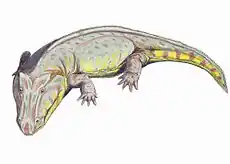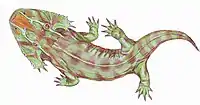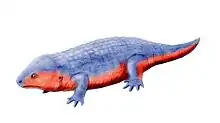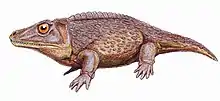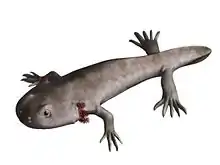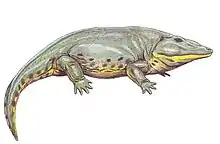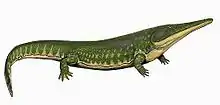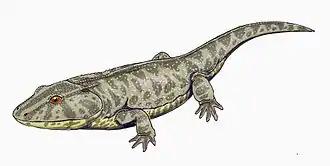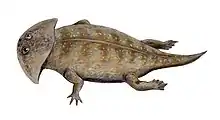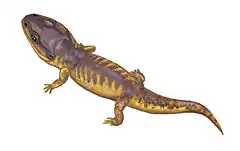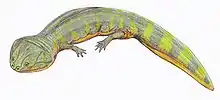Dasyceps
Dasyceps is an extinct genus of zatracheidid temnospondyl from the early Permian of England.
| Dasyceps Temporal range: Early Permian | |
|---|---|
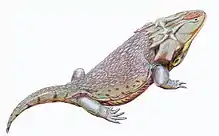 | |
| Dasyceps bucklandi | |
| Scientific classification | |
| Kingdom: | Animalia |
| Phylum: | Chordata |
| Order: | †Temnospondyli |
| Family: | †Zatrachydidae |
| Genus: | †Dasyceps Huxley, 1859 |
| Type species | |
| †Dasyceps bucklandi Lloyd, 1850 | |
| Synonyms | |
| |
History of study
Dasyceps was originally named in 1850[1] for the type species, D. bucklandi, which honors English paleontologist William Buckland, but under the now defunct genus "Labyrinthodon," which is now regarded as a junior synonym of the Triassic capitosaur Mastodonsaurus. The new genus name for the species was created by Thomas Huxley in 1859.[2] A detailed description of the taxon was given in German by the German paleontologist Friedrich von Huene in 1910.[3] The most recent description is that of Paton (1975).[4] A second species from Texas, D. microphthalmus, was originally named as a species of Zatrachys[5] but was moved to Dasyceps by Paton (1975).
Anatomy
Dasyceps is the largest of the three zatracheidid genera, with a skull length approaching 30 cm. It is diagnosed by the following features: (1) proportionately long, U-shaped skull and elongate premaxillae; (2) relatively posteriorly situated nares; (3) dorsal exposure of septomaxilla replaced by nasal and maxilla, which contact posterior to the naris, excluding the lacrimal; (4) quadratojugal expanded but without spikes; (5) tabular posteriorly expanded; (6) long suture between squamosal and tabular.[6] Compared to other zatracheidids, the internarial fontanelle of D. bucklandi forms a nearly perfect teardrop-shaped opening that divides the nasals more than in Acanthostomatops but that does not divide the frontals as is found in Zatrachys.
Dasyceps bucklandi is only known from a holotype skull split into a part and counterpart block. Dasyceps microphthalmus is known from the holotype and two referred specimens.
References
- Lloyd, G. (1850). "On a new species of Labyrinthodon from the New Red Sandstone of Warwickshire". British Association for the Advancement of Science. 19: 56–57.
- Huxley, Thomas H. (1859). "On Dasyceps bucklandi (Labyrinthodon bucklandi, Lloyd)". Memoirs of the Geological Society of the United Kingdom. 1859: 52–56.
- Huene, Friedrich von. (1910). Neubeschreibung des permischen stegocephalen Dasyceps bucklandi (Lloyd) aus Kenilworth. Fischer. OCLC 66304763.
- Paton, Roberta L. (1975). "A Lower Permian temnospondylous amphibian from the English Midlands". Palaeontology. 18 (4): 831–845.
- Cope, E. D. (1895). "The Reptilian Order Cotylosauria". Proceedings of the American Philosophical Society. 34 (149): 436–457. ISSN 0003-049X. JSTOR 982900.
- Schoch, Rainer R.; Milner, Andrew R. (2014). Sues, Hans-Dieter (ed.). Handbuch der Paläoherpetologie = Encyclopedia of paleoherpetology Part 3A2. Temnospondyli. Stuttgart: Verlag Dr. Friedrich Pfeil. ISBN 978-3-931516-26-0. OCLC 580976.
